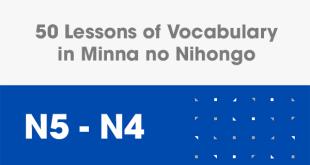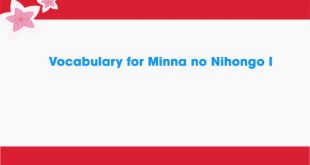Minna no nihongo grammar lesson 50 we will continue to learn about honorifics, namely the remaining 2 types of honorifics: humble and polite form.
1. Humble language
A condescending language used to speak about one’s own behavior through which to show respect to the listener or the speaker
A. お / ご~します
お / ご verbs groups I and II form ます + します
おもそうですね。おもちしましょうか (1)
It looks so heavy. Can I help you guys?
わたくじがしゃちょうにスケジュールをおしらせします (2)
I notify the schedule to the director
あにがくるまでおくります (3)
My brother will carry siblings by car
Persons speak using humble speech to speak to the listener in (1) and the person mentioned in (2). And (3) the subject is not a speaker but an outsider belonging to the same group as the speaker
Need to pay attention to this way of speaking, not to use the single-verb ます verb
ご verb group III
This expression is used with group III verbs. There are also other verbs like: [しょうかいします], [しょうたいします], [そうだんします], [れんらくします] ,… For exceptions like [でんわします], [やくそくします] ,… then we do not use [ご] but use [お] before verbs
Example:
きょうのよていをごせつめいします
I will explain the schedule today
B. The special humble verb
| Verb | Special humble verbs |
| いる | おる |
| 言う | もうす |
| たべる/飲む | いただく |
| する | いたす |
| 行く/来る | まいる |
| 見る | はいけんする |
For example:
日本からまいりました
I come from japan
おおかしをいただきたいです
I want to receive candy
けんきゅうじょのなかにおります
I am in the research room
2. Polite form
Usage: The polite way of speaking shows respect to the listener
The polite form of some words
ございます is the polite form of あります
でございます is the polite form of です
よろしでしょうか is the polite form of いいですか
Example:
でんわはかいだんのよこにございます
The phone in next to the stairs
がくせいでございます
I am a student
おのみものはなにがよろしでしょうか
What would you like to drink?
Related Post: Minna No Nihongo Lesson 50 Vocabulary
 Learn Japanese Free Learn Japanese Free
Learn Japanese Free Learn Japanese Free







